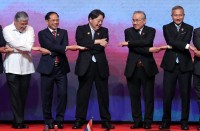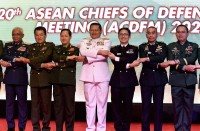MANILA – On 19 May 2015, the High Representative of the European Union for Foreign Affairs and Security Policy and the European Commission adopted the Joint Communication: “The EU and ASEAN: a partnership with a strategic purpose”. The Joint Communication puts forward concrete ideas for taking EU-ASEAN (Association of South East Asian Nations) relations to the next level by providing a more coherent framework for sectoral cooperation and by ensuring a sharper political focus.
“The partnership between the EU and ASEAN is crucial and we are determined to build on it and strengthen our political and economic cooperation. From trade to security, from climate change to the rule of law, we have a deep cooperation and as the EU we are supporting ASEAN integration. Deepening and broadening our relation with ASEAN is key for the EU’s Asia strategy,” said High Representative/Vice-President Federica Mogherini.
Concrete proposals and commitments contained in the Joint Communication include:
- Taking trade relations with ASEAN to a different level and working towards an ambitious region-to-region Free Trade Agreement (FTA) building on bilateral agreements between the EU and ASEAN Member States;
- Stepping up cooperation on ‘Connectivity’ by exchanging lessons learned and by mobilising the financial means and expertise to support ASEAN efforts, including on the single market and through negotiating a civil aviation agreement;
- Strengthening collaboration on climate change and initiating a new, dedicated EU-ASEAN policy dialogue on environment and sustainable development;
- More than doubling EU financial support for ASEAN integration (to 170 million) which comes on top of the EUR 2 billion for ASEAN Member States;
- Implementing an extensive ‘package’ of new initiatives in the area of non-traditional security (maritime security, disaster management and crisis response, transnational crime, training courses on preventive diplomacy, crisis management, mediation, the rule of law and election observation).
Last year’s EU-ASEAN Ministerial Meeting (Brussels, 23 July 2014) welcomed the stepping up of EU-ASEAN relations and expressed the wish to upgrade them to a Strategic Partnership. By adopting the present Joint Communication, both the EEAS and the Commission intend to contribute proactively to the future of EU-ASEAN relations.
Background:
The start of the relations between EU and ASEAN dates back to 1972, but it is in the last 3 years that a step change has taken place with, inter alia, a very large number of high-level visits to the region. In October 2014, the EU and ASEAN met for an informal Leaders’ Meeting for the first time since 2007. A dedicated EU Ambassador to ASEAN will take up duties in Jakarta in September 2015.
The EU is ASEAN’s second largest trading partner. EUR 238 billion in goods and services were traded between the two regions in 2013. EU-ASEAN trade grew on average by 7% annually in the period 1993-2013. The EU is the biggest provider of Foreign Direct Investment in ASEAN. EU FDI is 22% of the total in 2013.
The EU is a major development partner of ASEAN and the biggest donor to the ASEAN Secretariat. In the current budget cycle (2014-2020), the EU will support the ASEAN integration and the Secretariat with EUR 170 million, more than double the amount under the previous cycle (close to EUR 70 million, 2007-2013).
Stepping up engagement on non-traditional security. The EU is an active member of the ASEAN Regional Forum. The EU and ASEAN work together to enhance crisis response and disaster management; the EU supports the ASEAN Centre for Humanitarian Assistance. The EU and ASEAN organised the Second High-Level Dialogue on maritime security cooperation in Kuala Lumpur in May 2015, to exchange lessons learnt on integrated and cooperative approaches to maritime issues, such as inter-agency cooperation, tackling transnational crime and port security. (Eagle News Service/European Union Delegation to the Philippines)







